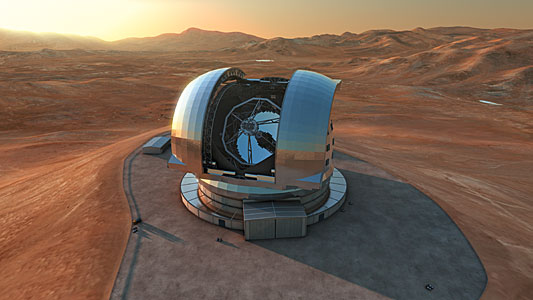Portuguese companies win contracts to build the world's most advanced optical telescope

It has been called "the world's largest eye on the sky." In fact, the E-ELT ( European Extremely Large Telescope) will have a main mirror 39 meters in diameter and the capacity to collect 13 times more radiation than the largest existing optical telescopes. The E-ELT will also be able to correct the effects of atmospheric distortion and produce images 16 times sharper than the Hubble Space Telescope. The E-ELT will take nine years to become operational, with the first observations expected in 2024. Construction of this ambitious telescope will begin in 2016, and in Call by ESO for Phase 1, two Portuguese entities stood out among international competitors to secure contracts worth a total of €1.5 million.
A CRITICAL Software, a software solutions development company, and ISQ, a private entity that provides inspection, testing, engineering, training, and technical consulting services, have just signed three-year contracts with ESO, with an option to extend to nine and ten years, respectively.
CRITICAL Software's proposal beat 12 others submitted by companies from the Czech Republic, Germany, Italy, Spain, the United Kingdom, and Chile. ISQ's proposal was ranked highest among five evaluated, submitted by similar organizations from Spain and Germany.
Under this contract, CRITICAL Software will provide independent software validation and verification (ISV&V) services for the E-ELT program. The tasks involved include analyzing software requirements for the telescope control systems and preparing and executing manual and automated tests, among others. ISQ will guarantee the verification of materials, parts, and final products through independent audits, surveillance, testing, and inspections, in order to support ESO in Quality Assurance/Quality Control (QA/QC) for the construction and assembly of the most critical structures and systems.
The activities of both will take place during the assembly, integration, and verification phases in several European countries, Brazil, and at the E-ELT construction site on Cerro Amazones, a mountain about 3,060 meters high in the Atacama Desert plateau in Chile. With this powerful "eye," the international astronomical community will be able to study the greatest scientific challenges of our time—the search for Earth-like exoplanets, the measurement of the properties of the first stars and galaxies, and the nature of dark matter and dark energy.
According to Pedro Carneiro, vice president of FCT, the entity representing Portugal on the ESO Council, “The success of CRITICAL Software and ISQ demonstrates the international competitiveness of our industry and the close monitoring of the Portuguese delegation at ESO.”
“This is excellent news for ESO, Portugal, and FCT, ISQ, and CRITICAL Software. ESO will benefit from the experience, professionalism, and dynamism of two entities that have distinguished themselves internationally in sectors traditionally dominated by companies from countries that are more developed in terms of technological and organizational capacity,” says Paulo Chaves, Business Leader at ISQ.
For Paulo Guedes, Business Development Director at CRITICAL Software, “We are delighted to have been selected to build the world's most advanced optical telescope in partnership with ISQ. This is unequivocal international recognition of the quality of work carried out by both ISQ and CRITICAL Software, which over the years has excelled in extremely demanding areas and markets.”